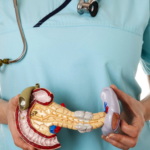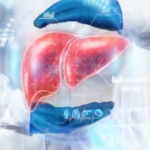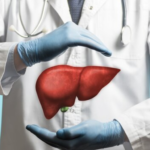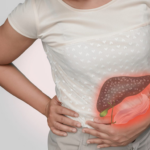
Pancreatitis is an inflammatory condition of the pancreas that can range from mild to life-threatening. Early detection is crucial to prevent severe complications. Recognizing the symptoms at an early stage allows for timely medical intervention, reducing the risk of long-term damage. If you are experiencing persistent abdominal pain, nausea, or digestive issues, consulting an expert like Dr. Prasad Bhate, a leading gastroenterologist and liver specialist in Baner, Pune, is essential. At Dr. Prasad Bhate’s Gastro Liver Clinic, patients receive specialized care for digestive disorders. If you are looking for a trusted gastroenterologist in Baner or a liver specialist in PCMC, understanding the early signs of pancreatitis can help you seek timely medical assistance.
What is Pancreatitis?
The pancreas is a vital organ that produces digestive enzymes and insulin to regulate blood sugar levels. Pancreatitis occurs when the pancreas becomes inflamed due to factors such as gallstones, excessive alcohol consumption, high triglycerides, or certain medications. The condition can be acute (sudden and severe) or chronic (long-lasting and progressive). Early symptoms can sometimes be mild and mistaken for common digestive issues, making awareness crucial.
Early Signs of Pancreatitis
Recognizing the initial symptoms of pancreatitis can help in seeking medical care before the condition worsens. Here are some early warning signs:
1. Persistent Abdominal Pain
- One of the earliest and most common signs of pancreatitis is pain in the upper abdomen.
- The pain may start mildly but often becomes severe and persistent.
- It can radiate to the back or worsen after eating, especially fatty foods.
- Unlike common stomach aches, this pain doesn’t go away with rest or home remedies.
2. Nausea and Vomiting
- Pancreatitis often causes persistent nausea and episodes of vomiting.
- Even after vomiting, the discomfort usually doesn’t subside.
- If nausea persists for hours or is accompanied by other symptoms, it could be a sign of an inflamed pancreas.
3. Loss of Appetite and Unintentional Weight Loss
- Inflammation in the pancreas affects digestion, leading to loss of appetite.
- Patients may experience rapid weight loss due to difficulty in digesting food properly.
- This occurs because the pancreas is unable to produce enough enzymes to break down fats and nutrients.
4. Fever and Chills
- In some cases, pancreatitis can cause a low-grade fever, indicating an infection or inflammation.
- Chills and fever accompanied by abdominal pain should not be ignored.
5. Bloating and Indigestion
- Many patients experience abdominal bloating, gas, and indigestion.
- This happens because the pancreas is unable to properly digest food, leading to discomfort after meals.
6. Jaundice (Yellowing of Skin and Eyes)
- If gallstones are blocking the bile duct, it can lead to jaundice.
- Yellowing of the skin and eyes, along with dark urine, could be an indication of pancreatitis.
7. Fatty, Foul-Smelling Stools (Steatorrhea)
- When the pancreas isn’t producing enough enzymes, fat digestion is impaired.
- This results in pale, greasy, foul-smelling stools that float in the toilet.
- Persistent changes in stool consistency should be taken seriously.
When to See a Doctor?
If you experience severe, persistent abdominal pain or any combination of the symptoms mentioned above, seek immediate medical attention. Delaying treatment can lead to complications like infection, internal bleeding, pancreatic necrosis, or diabetes. Contact a specialist like Dr. Prasad Bhate, a reputed gastroenterologist in Baner, Pune, for early diagnosis and treatment.
Diagnosis and Treatment Options
A gastroenterologist will conduct various tests to diagnose pancreatitis, including:
- Blood Tests: To check for elevated pancreatic enzymes.
- Imaging Tests (CT Scan, MRI, or Ultrasound): To assess pancreatic inflammation.
- Endoscopic Ultrasound (EUS): To check for gallstones or duct blockages.
- Stool Tests: To check for fat malabsorption in chronic pancreatitis.
Treatment Approaches Include:
- Hospitalization and Supportive Care: IV fluids, pain management, and fasting to allow the pancreas to heal.
- Lifestyle Modifications: Avoiding alcohol, smoking, and adopting a low-fat diet.
- Enzyme Supplements: To aid digestion for chronic cases.
- Surgical Intervention: In severe cases, gallstone removal or pancreatic surgery may be needed.
Prevention Tips
To reduce the risk of pancreatitis, consider the following:
- Maintain a healthy diet rich in fruits, vegetables, and lean proteins.
- Limit alcohol consumption and avoid smoking.
- Stay hydrated and exercise regularly.
- Manage underlying conditions like high triglycerides or gallstones.
Summary:
Pancreatitis can be a serious condition if left untreated. Recognizing the early warning signs such as persistent abdominal pain, nausea, jaundice, and digestive issues can help in getting timely medical care. If you or a loved one is experiencing symptoms, consult Dr. Prasad Bhate, a trusted gastroenterologist and liver specialist in Baner, Pune. At Dr. Prasad Bhate’s Gastro Liver Clinic, expert diagnosis and advanced treatment options ensure the best care for your digestive health. Don’t ignore the signs—seek medical attention early to prevent complications.




